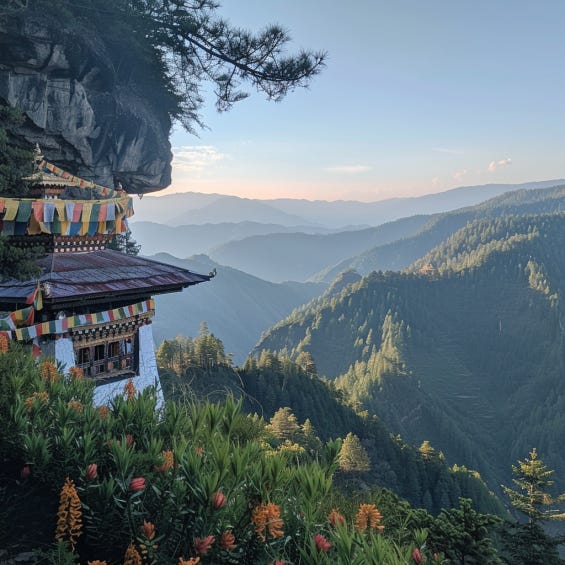The World's Happiest Country
is not so happy afterall
Happy Wednesday! We’ve made it halfway through the week—time to take a little breather.
For today’s task…
📌 Try a quick five-minute dance break
It shakes off any sluggishness and gets your blood flowing, giving you a quick energy lift. Also, stepping away from your work or routine for a short dance break helps you return feeling more focused and ready to tackle whatever’s next.
Now, let’s start with the day…
Let’s talk about Bhutan
Bhutan, the land of Gross National Happiness, has a reputation for putting happiness before economic success. But here's the reality - most Bhutanese workers are far from the serene, carefree life we imagine. Bhutan actually tops the global charts for working the longest hours. Yup, you read that right! The average Bhutanese worker clocks in a whopping 54.4 hours a week, compared to 38 hours in the US.
And get this - over 60% of the workforce in Bhutan works more than 48 hours a week. According to the World Bank, that's the threshold for “overwork.” The long hours are especially common in places like family businesses, construction, and hospitality.
For example, just look at Ten Choezim, a 22-year-old hotel worker in Thimphu, Bhutan’s capital.
She’s supposed to work a 12-hour shift, but that’s just a suggestion. She’s regularly hitting 16-hour days, racking up 112 hours a week. She’s not alone. A lot of Bhutanese workers are stuck in the same grind because they have no other choice. If Ten didn’t put in those extra hours, she wouldn’t be able to afford to live. So she pushes through the exhaustion, sore legs, and mental fatigue.
This exhausting work culture has driven many young Bhutanese to pack their bags and head for better working conditions abroad, with Australia being the top choice. The migration has become so widespread that 9% of Bhutan's population—roughly 64,000 people—has left the country. Prime Minister Tshering Tobgay even called it an "existential crisis" during his State of the Nation address. And I have to say, it sounds pretty serious.
With so many skilled workers leaving, Bhutan is facing a major brain drain, and those left behind are shouldering even more work.
Also, you’d think labor laws would offer some protection, right? In theory, they do.
There are rules for an eight-hour workday and overtime pay, but in reality, these laws aren’t enforced. There are people like Namgyal Dorji Wangchuk, a 43-year-old sales professional, are working up to 90 hours a week and still taking on freelance work just to make ends meet. He’s got two teenage daughters to raise, and balancing work and family is a daily struggle.
So, while Bhutan’s commitment to Gross National Happiness sounds amazing on paper, the reality for many workers is far from happy. It’s a tough balance between the country’s ideals and the day-to-day grind, and for a lot of people, the scales are tipping toward burnout over bliss.
So, that’s it for today. Let’s meet again tomorrow 👋 Till then, stay safe!



